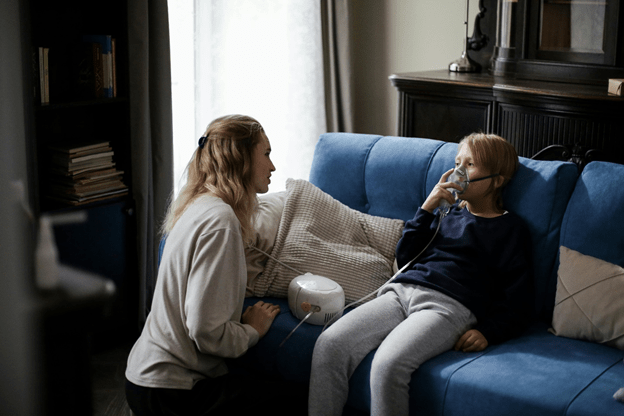Asthma :
Asthma is a long-term disease caused by inflammation of the airways in the lungs.
You can develop asthma at any age.
Symptoms of Asthma :
Symptoms include:
- The meal
- Wheezing sound in chest
- Tightness in the chest
- Shortness of breath
Symptoms may vary from person to person. They are often worse at night and early in the morning, or with certain stimuli.
In most people, asthma is well controlled most of the time. It should not limit your daily life (including sleep) in any way. You should work with your doctors to help control your asthma.
When to seek medical advice :
Call 999 if:
- You have asthma and:
- Your reliever inhaler (which is usually blue) is not helping symptoms as well as usual, or at all
- Your wheezing, coughing and chest tightness are becoming severe and persistent
- Shortness of breath prevents you from eating, speaking or sleeping
- Your breathing is fast (in children, you can see their abdominal muscles, even if their throat area is tense, and they struggle to breathe)
- Your heart is beating fast
- Your heart rate is low
- You are feeling lethargic, tired or dizzy because of your asthma
- Your lips or fingers turning blue (cyanosis)
- If you use a peak flow meter, your peak expiratory flow decreases
These are symptoms of an asthma attack.
Talk to your GP if:
- You are wheezing (whistling sound while breathing)
- You feel short of breath
- Your chest feels tight – like a band is tied around it
- You have had a cough for more than 3 weeks
- You have asthma and your symptoms are affecting your daily life
What to do when you have an asthma attack :
- Take 1 to 2 puffs of your reliever inhaler (usually blue) right away. If you have a spacer, use it. If it is 2 puffs, they should be taken one at a time.
- Sit down and try to breathe.
- If you start to feel unwell, take 1 puff of your reliever inhaler every 1 minute. You can take a maximum of 10 puffs. This is easy if you have a spacer.
- If you do not feel better after taking the inhaler or you are worried, call 999.
- If an ambulance has not arrived within 10 minutes and you still feel sick, repeat step 3.
- Your inhaler may run out. If possible, switch to another inhaler to see if it helps.
- If your symptoms improve and you do not need to call 999, you still have 24 hours
Diagnosing Asthma :
If you have asthma symptoms, your GP may ask you to:
- When do your symptoms appear?
- How often do you have symptoms?
- Have you felt any stimulation?
- Do you have eczema or hay fever?
Tests :
The following tests may be recommended to you:
- Spirometry – where you breathe into a machine to see how well your lungs are working.
- Peak Expiratory Flow Test – This is measured using a small hand-held device to measure how fast you can blow air out of your lungs in one breath.
- Airways Responsiveness – Measures how your airways react to contact with a stimulus.
- Testing Airway Inflammation – This is done either through a sputum sample or by measuring your nitric oxide levels (a high level can be a sign of airway inflammation).
- Allergy Tests – to check if your asthma is related to allergies such as dust mites, pollen, or food
Treatment of Asthma :
There is no permanent cure for asthma, but there are treatments that may help:
- Prevent future symptoms and attacks
- Relieve your symptoms
Most people will take the medicine once or twice a day, usually using an inhaler. Your nurse, doctor or pharmacist will tell you how to use your inhaler correctly.
Watch Asthma + Lung UK videos on how to use your inhaler
It is also important to find and avoid your potential triggers.
Some treatments may have side effects.
Personal Asthma Action Plan :
If you are diagnosed with asthma, your healthcare professional will agree a personalized asthma action plan with you. This information may include:
- What medicines you need to take
- How to recognize when your symptoms are getting worse
- What to do if your symptoms get worse
Your personal asthma action plan should be reviewed at least once a year with your nurse, doctor or pharmacist. If your symptoms are severe, you may be evaluated regularly.
Sedative Inhalers :
Sedative inhalers – usually blue – relieve asthma symptoms quickly, usually within 3 to 5 minutes. These dilate your airways, making it easier to breathe again. It is a short-acting drug and lasts for about 4 hours.
Every asthma patient should be given a reliever inhaler, which is usually blue or can be a combination inhaler that you normally use for maintenance therapy. If your asthma is well controlled, you will rarely need to use an additional relief inhaler.
Preventive Inhalers :
Preventive inhalers work over time to reduce airway inflammation and sensitivity. These reduce the chances of asthma attacks. They should be used regularly (usually twice a day) to keep asthma under control. It may take a while for your preventative inhaler to work fully. You may still occasionally need a blue sedative inhaler.
If you smoke, preventer inhalers may not be as effective for you.
Compound Inhalers :
If your asthma isn’t controlled using both reliever and preventer inhalers, you may need an inhaler that combines the two.
Combination inhalers are used every day to help prevent symptoms and provide long-term relief if they do occur. Some combination inhalers can also be used as sedatives and can be your general preventative medicine. This is called MART (maintenance and palliative therapy) or AIR (anti-inflammatory palliative therapy) treatment.
It is important to use it regularly, even if you have no symptoms.
Used Inhalers :
There is no recycling scheme available for used inhalers. You should return all your used or expired inhalers to your community pharmacy for safe disposed should be replaced annually if used regularly. Old spacers go in the household trash.
Other Preventive Medicines :
If your asthma is not controlled by using inhalers alone, you may be prescribed the following medications:
- Montelukast – pills that block part of the chemical reaction involved in inflammation of the airways.
- Theophyllines – pills that relax the muscles around the airways to help them dilate, and are also relatively weak anti-inflammatory agents.

